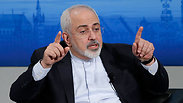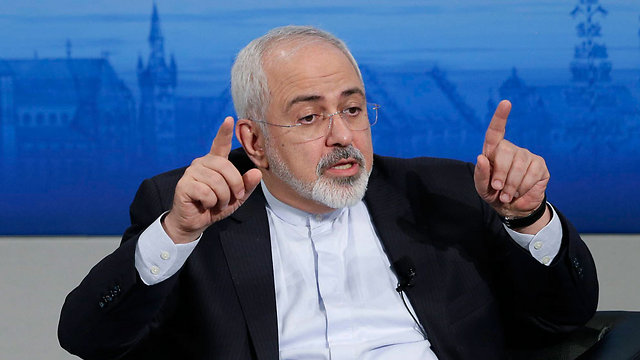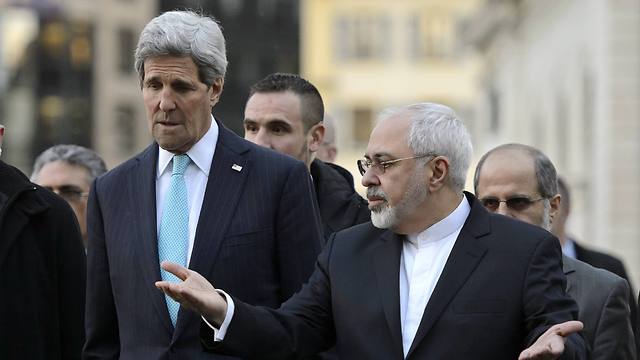
Iran on Tuesday rejected as "unacceptable" a demand by US President Barack Obama that Tehran freeze its sensitive nuclear activities for at least 10 years, the semi-official Fars news agency reported.
"Obama's stance ... is expressed in unacceptable and threatening phrases ... Iran will not accept excessive and illogical demands," Foreign Minister Mohammad Javad Zarif was quoted as saying by Fars. "Tehran will continue nuclear negotiations with the six powers," he added.
Zarif met with US Secretary of State John Kerry in Geneva Tuesday as they try to pin down a political framework for a deal to rein in Tehran's nuclear program by a March 31 deadline.
In an interview with Reuters on Monday, Obama said Iran must commit to a verifiable halt of at least 10 years on sensitive nuclear work for a landmark atomic deal to be reached between Tehran and six major powers.
“If, in fact, Iran is willing to agree to double-digit years of keeping their program where it is right now and, in fact, rolling back elements of it that currently exist ... if we’ve got that, and we’ve got a way of verifying that, there’s no other steps we can take that would give us such assurance that they don’t have a nuclear weapon," Obama said.
Despite the tough tone of Zarif's remarks quoted by Fars, the Iranian struck a more conciliatory tone when he spoke briefly to reporters after about two hours of talks with Kerry.
Asked if the two sides had reached an agreement, Zarif replied: "We'll try, that's why we are here."
"There is a seriousness that we need to move forward. As we have said all along, we need the necessary political will to understand that the only way to move forward is though negotiations," he added.
Speaking after the morning round of talks, Kerry told reporters: "We're working away. Productively."
Nuclear politics
The United States and its European allies fear Iran wants to develop atomic bomb capability. Tehran says its program is for peaceful nuclear energy only.
Iran and the United States, Britain, France, China, Russia and Germany have set a deadline of late March for a framework agreement and June for a comprehensive final settlement that would curb Iran's nuclear activity to ensure it cannot be put to bomb-making in return for the lifting of international sanctions that have harmed Iran's economy.
Iran wants a swift lifting of the sanctions in any deal curbing its nuclear program - one of the sticking points in high-level negotiations continuing in Switzerland this week.
Obama's comment about the time frame for a freeze represents one of the US government's strongest signals yet of its red line for a successful agreement.
Prime Minister Benjamin Netanyahu will escalate his campaign against Obama's Iran diplomacy on Tuesday in a speech to Congress whose staging has put unprecedented stress on the two leaders' already strained ties.
Although cold-shouldered by the administration, Netanyahu has offered an olive branch, saying he meant no disrespect to Obama by accepting an invitation to address US lawmakers that was orchestrated by the president's rival Republicans.
The White House is wary of Netanyahu using the forum to lay bare the closed-door negotiations designed to curb Iran's nuclear drive. Obama on Monday appeared to wave off any prospect the bedrock US alliance with Israel might be ruined by the rancor.
"I don't think it's permanently destructive," Obama told Reuters in an interview. "I think that it is a distraction from what should be our focus. And our focus should be, 'How do we stop Iran from getting a nuclear weapon?'"
Netanyahu, who has played up his security credentials ahead of a closely contested March 17 election in Israel, has denied his speech would have any design other than national survival.
"I plan to speak about an Iranian regime that is threatening to destroy Israel," he told the pro-Israel US lobby AIPAC on Monday.
He did not elaborate on the speech's content. One aide said Netanyahu would inform US lawmakers of details on the nuclear talks in hope they would question the administration and thus defer a March-end target date for a framework deal with Iran.
Israel believed members of Congress "do not necessarily know the details of the deal coming together, which we do not see as a good deal," the aide told reporters on condition of anonymity.
Netanyahu wants the Iranians stripped of nuclear projects that might be used to get a bomb - something Tehran insists it does not want. Washington deems the Israeli demand unrealistic.
Under a 2013 interim deal, the United States and five other powers agreed in principle to let Iran maintain limited uranium enrichment technologies. U.S. national security adviser Susan Rice argued on Monday that this commitment could not be undone.
"As desirable as that would be it is neither realistic nor achievable," she told AIPAC, over cheers by some audience members supporting Netanyahu's hard-line tack on the Iran talks.
"If that is out goal, our partners will abandon us and undermine the very sanctions we have imposed so effectively together," Rice added, urging US lawmakers not to intervene. Congress, she said, "shouldn't play the spoiler now."
A deal with Iran is far from guaranteed, given US assessments that more than a decade of carrot-and-stick diplomacy with Iran might again fail to clinch a final accord.
"I would say that it's probably still more likely than not that Iran doesn't get to yes," Obama told Reuters. "It is more likely that we could get a deal now than perhaps three or five months ago. But there are still some big gaps that have to be filled."

















